How to learn - without forgetting
Key message: Learning without forgetting - is that possible?
Good learners create a "network of information" around the basic ideas. Beginners
tend to learn isolated facts and formulas that they quickly forget. If we master the basic ideas very well,
we will recognize them in our everyday lives and be able to derive the details from
them.
What is learning?
Learning is the acquisition of knowledge or skills. Skills can be mental or motor skills. Mental skills include, for example, analytical-creative thinking, linguistic and social skills.
Learning has two goals with regard to knowledge:
- We want to be able to remember something.
- We want to understand something.
How can we remember something for a long time?
Once we have learned something, we don't want to forget it again straight away. But forgetting is a natural process:
"Forgetting is an important ... process that is actively controlled by our brain. Otherwise we would not be able to organize the continuous changes and the enormous amounts of information that
constantly flow to us. " (www.br.de/wissen/vergessen-gehirn-strategie-filter-100.html, 05.11.2021)
What can we do to ensure that we do not immediately forget what we have learned?
"How do you store information so that it is retained?
- Exercise
- Distributed learning
- Elaboration [= processing something]
- Memory aids
... Elaboration [processing/understanding] is crucial" (www.allpsych.uni-giessen.de/thomas/teaching/pdf/G2006/Gedaechtnis2.pdf,
05.11.21)
It is clear that we can memorize something and remember it for a certain period of time through "exercise" (here "exercise" means repeating it several times). It is advantageous if the practice
takes place over a longer period of time (= "distributed learning", repeating something several times over a few days is better than repeating everything very often in one day).
We learn with "memory aids" when we combine the information to be learned with pictorial, personal, surprising, humorous or other information, e.g. with a mnemonic sentence or a meaningful
picture.
We learn information particularly well that is related to things we know from our everyday lives ("we have difficulty retaining detailed knowledge that is rarely used" see below).
If we want to remember something, it is important that we have understood it ("Elaboration = processing is crucial").
"For new content to be understood, retained and applied, the new information must be linked to existing knowledge, which means it must be elaborated." (Krause, U.-M., Stark, R. (2006). Vorwissen aktivieren. In: H. Mandl, H.F. Friedrich (Hrsg.). Handbuch Lernstrategie. Göttingen: Hogrefe, p. 41)
How can we understand something?
"… if we lived in an unpredictable world, where things changed in random or very complex ways, we were not be able to figure things out. But we live in an … universe, where things change, but according to patterns, rules, or as we call them, laws of nature. … And so it becomes possible to figure things out. We can do science, and with it we can improve our lives." (Sagan, C. (2013). Cosmos. New York: Randon House Publishing Group, p. 41)
If we want to understand a thing in our universe, then we have to recognize which rules (and facts) apply to this thing (if we want to understand why things fall from a height to the ground, we need to know gravity).
There are the big rules in our universe (the laws of nature) that apply to many things and there are the special rules that only apply to special things. We can only understand a thing if we know both types of rules (the general and the special ones) that apply to that thing.
Example of a big rule: classical mechanics
"Classical mechanics describes the motion of bodies due to external forces. ... Initially, mechanics developed independently into terrestrial and celestial mechanics. The significant achievement of Sir Isaac Newton was the realization that the motion sequences on earth are subject to the same laws of nature as the motion of all celestial bodies." (https://itp.uni-frankfurt.de/~luedde/Lecture/Mechanik/Intranet/Skript/MechanikSkript.pdf, 20.01.24, p. 1-3)
Other examples of big rules ("big ideas" see below): evolution, the definition of health, the declaration of human rights, ...
"We turn now to the question of how experts’ knowledge is organized and how this affects their abilities to understand and represent problems. Their knowledge is not simply a list of facts and formulas that are relevant to their domain; instead, their knowledge is organized around core concepts or “big ideas” that guide their thinking about their domains. ... Novices’ knowledge is much less likely to be organized around big ideas; they are more likely to approach problems by searching for correct formulas and pat answers that fit their everyday intuitions. ... Experts step back from their first, oversimplistic interpretation of a problem or situation and question their own knowledge ... " (National Research Council (2000). How People Learn: Brain, Mind, Experience, and School: Expanded Edition. Washington, DC: The National Academies Press, www.nap.edu/read/9853/chapter/5, p. 36 - 50)
Since there are few general (big) rules, but many specific (small) rules, it is better to know and apply the general rules very well and then try to derive the specific rules for a thing from the general rules (derive the details from the basics).
"In an example from physics, experts and competent beginners (college students) were asked to describe verbally the approach they would use to solve physics problems. Experts usually mentioned the major principle(s) or law(s) that were applicable to the problem, together with a rationale for why those laws applied to the problem and how one could apply them (Chi et al., 1981). In contrast, competent beginners rarely referred to major principles and laws in physics; instead, they typically described which equations they would use and how those equations would be manipulated (Larkin, 1981, 1983)." ((National Research Council (2000). How People Learn: Brain, Mind, Experience, and School: Expanded Edition. Washington, DC: The National Academies Press www.nap.edu/read/9853/chapter/5, p. 37)
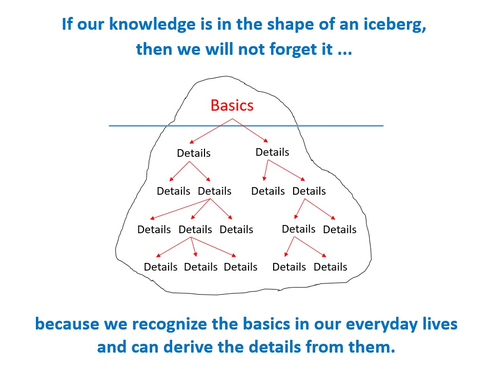
When we learn, our brain forms connections between the information that already exists and the new information we take in.
"As expertise develops, knowledge transitions from being a collection of isolated facts to a heavily integrated network of information and decision-making process,
conditional on a set of circumstances." (Persky, A. M., & Robinson, J. D. (2017). Moving from novice to expertise and its implications for instruction. American journal of pharmaceutical
education, 81(9), 6065, p. 76, www.ncbi.nlm.nih.gov/pmc/articles/PMC5738945/?trk=public_post_comment-text, 09.02.24)
In such a "network of information", the information is organized into categories/classes that group together things or terms with similar properties. When we categorize, we focus on the essential properties of a thing. This reduces the amount of information. At the same time, we associate the thing with other (essential) information that we already know about the category to which it belongs.
"Categorization is a basic cognitive [fundamental mental] ability that sorts incoming sensory impressions and assigns them to specific groups based on perceived similarities. ... What is so beneficial about categorization? Obviously, categorization allows us to organize information and thus reduce the amount of information. However, an additional fundamental processing advantage arises above all from the fact that categorization establishes connections between incoming environmental stimuli and stored prior knowledge. ... Categorization is based on the fact that our brain does not simply store experiences unsorted, but arranges them according to similarities and patterns ..." (Degner, J. (2022). Grundprinzipien der Informationsverarbeitung. In Vorurteile: haben immer nur die anderen. Berlin, Heidelberg: Springer Berlin Heidelberg, p. 75, 76, 78)
Categorizing gives our knowledge a hierarchical structure. The categories are linked to each other via “big/basic ideas”. The detailed information in the categories is also interconnected.
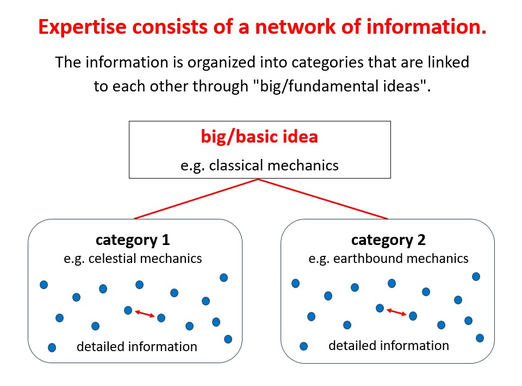
When it says: “You have to recognize the connections!” Then what are the connections? Two things have a connection if there are rules that apply to both. For example, scientists recognized that the rules of classical mechanics apply to both celestial mechanics and terrestrial mechanics. We can only recognize the connections if we have understood the information about the things in question.
How should we learn?
Our brain is "attuned to the generalization of experiences". It wants to find the "big ideas" that can be applied in many life situations:
"Why do we often find learning so difficult, even though it is a fundamental characteristic of our brain? ... Our brain is not actually designed to learn and retain knowledge, especially detailed knowledge that is rarely used. Every human brain is evolutionarily more attuned to skill and the collection and generalization of experiences that enable us to survive in our environment." (Rost, F. (2018) Lern- und Arbeitstechniken für das Studium. Springer VS, Wiesbaden, p. 34)
Our goal should be to remember the important and forget the unimportant.
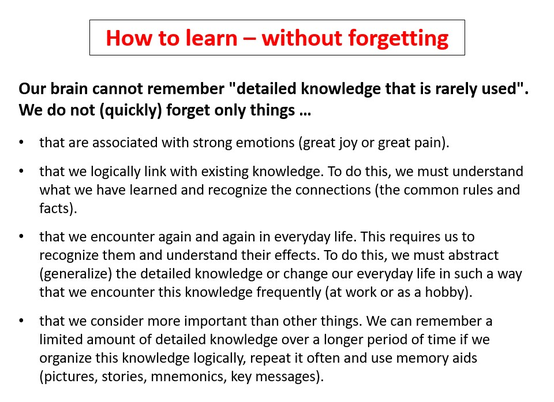
We can only absorb a limited amount of detail in a learning unit. Therefore, we too should organize the knowledge of a learning unit around "core concepts or "big ideas" as experts do (see quote above). Then we can derive the details from the ideas.
Memory athletes memorize strong images and stories and derive the real things they want to remember from them.
See the interview in the taz at https://taz.de/Gedaechtnissportler-ueber-seine-Techniken/!5900181, 21.01.24:
"The main principle is that you have to visualize what you want to remember. ... What's important is that you think of strong images and stories. ... without emotions you can't remember things well." Before: "Memorizing numbers is completely different than understanding physical or mathematical laws. The fact that you can remember things doesn't mean that you understand them."
Since we don't just want to remember the learning material, but also to understand it, we can't just make up random images, but must use the "big ideas" that form the basis for the details of the learning material. We should therefore find a "basic idea" for each learning unit (each lesson, each lecture, each text, each presentation) and then formulate a key message for the idea.
It is only possible to formulate an optimally fitting key message once you have understood the subject matter really well. However, it is important to try and practise it at all. Even if the core message is not optimal, it still has advantages, as the approach of memory athletes proves. (Finding a key message for a text is explained on Learn-Study-Work, see "How to write a text".)
How do we find the basic idea for a learning unit?
To understand a learning unit, we need to analyze it. We can then draw a conclusion from the analysis and thus find the basic idea for this learning unit.
An "Analysis ... is the process of breaking a complex topic or substance into smaller parts in order to gain a better understanding of it." (https://en.wikipedia.org/wiki/Analysis, 06.02.24)
So we break down an object (e.g. a learning unit) into its components and then ...
- we examine the properties of the components and the relationships between the components,
- we recognize the rules that apply to these relationships,
- we draw the correct conclusions.
An object can consist of components, but it can also be a component of something itself. For example, an engine is a component of a car and at the same time it itself consists of components. To understand the function of the engine, you have to understand the relationships between the things inside and outside the engine.
Simple example: Calculate the area of the blue rectangle
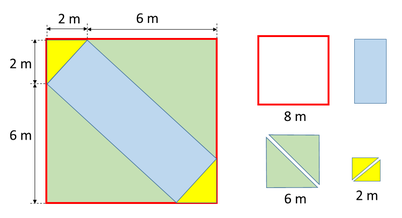
The figure is broken
down into the areas of which it consists. You can see that you have to subtract the 4 triangles from the area with the red border to obtain the blue area. The rule for calculating the area of a
rectangle is F = side a x side b. The area with the red border is a square, therefore a = b. The area is F = a x a = 8 m x 8 m = 64 m2. The two green and yellow triangles
together also form squares. Therefore, the area of the blue rectangle is F = 64 m2
- 6 m x 6 m - 2 m x 2
m = (64 - 36 - 4) m2
=
24 m2
The area of the triangles could also be calculated individually using the formula
F = base side x height x 1/2 .
General conclusion (key message): A partial area can be calculated by subtracting all other partial areas from the total area. The prerequisite is that all other partial areas are known.
Knowledge consists of facts and rules. In the example, the lengths of the pages are the facts and the calculation formulas are the rules. Rules are conditional statements that indicate which result is obtained when a certain condition is met: if this condition is met, then this result is obtained. Applied to a mathematical formula, this means: if I carry out the calculation steps of the formula, then I get the result I am looking for.
Another example of an analysis:
When interpreting a poetic text, there is a triangular relationship between the author, her work and the reader, the three parts of which must be analyzed. In order for the reader to interpret
the work "correctly", he or she should know the rules the author used to write the poetic text.
Analyzing is a skill and skills are learned by practicing them (by applying them). We can practice analyzing in every subject and for every task. Once we have learned to analyze, we can draw the right conclusions from an analysis and formulate a key message quite quickly.
How to conclude a key message?
We need to understand "a thing, an event or a situation" in order to be able to infer the correct key message.
"To grasp the meaning of a thing, an event, or a situation is to see it in its relations to other things: to see how it operates or functions, what consequences follow from it, what causes it, what uses it can be put to." (Dewey, J. (1933). How We Think: restatement of the relation of reflective thinking to the educative process. Boston, D.C. Heath and Co., p. 137)
In order to understand something, we have to analyze it. Analyzing means breaking something down into its components and gathering as much information as possible about these components and the relationships between them.
Concluding a key message takes place in two steps: First, we decide which of the collected information is important and which is not so important. Then we look at the list of important information and remember that our conclusion must take into account that "the whole is greater than the sum of its parts." "The whole" is here (when concluding a key massage) the "most important of the important". However, "the whole thing" (the key message) depends on what we want (depends on the "perspective" we look at the matter).
Should the key message describe "how a thing operates or functions, what consequences follow from it, what causes it, what uses it can be put to?" For each question, the key message is different. If we are lucky, the "most important of the important" is one piece of information on our list of important information. However, we will probably have to combine several of the important pieces of information and formulate a new sentence.
Example combustion engine:
An object can be a component of something, but it can also consist of components itself. For example, an internal combustion engine is a component of a car and at the same time it itself consists of parts. To understand the function of the engine, you have to understand the relationships between the things inside and outside the engine.
The key message about an internal combustion engine might be: "When it comes to how an internal combustion engine works, you need to know that in one or more cylinders of the engine a fuel-air mixture is burned by an explosion, causing the resulting exhaust gases to move a piston in the cylinder or cylinders."
When it comes to complex (complicated) things/events/situations, drawing conclusions is not so easy. We often lack information. Then we have to get creative: We have to consider all possibilities for the unknown and choose the most likely option. Creative analysis and reasoning is explained on Learn-Study-Work, see "How to analyze situations/systems" and "How to be creative" (the texts are not so easy to understand, however).
Unfortunately, there are people who find it too much effort to gather all the necessary information about a situation and to answer the basic questions about this situation precisely. As soon as they have an initial idea for a conclusion, they end the analysis. But in most difficult analyses, the first idea is not the best one. Once they have an initial idea for a conclusion, they stop the analysis. But most of the time when it comes to difficult analyses, the first idea is not the best.
How can we transfer something from our short-term to our long-term memory?
"Since the capacity of short-term memory is limited to an average of 3.5 (up to a maximum of 5) elements and meaningful information is retained better than meaningless information, it is important to form 'chunks'. ... Only the long-term memory ... protects knowledge from being forgotten ... The brain proceeds in an economical way, i.e. it integrates, reduces, generalizes and abstracts ... Since the brain works in this way, we should support it by actively forming so-called 'super signs', i.e. key words, structures and hierarchies (superordinate and subordinate terms) along which the memory can reconstruct further information through associations." (Rost, F. (2018) Lern- und Arbeitstechniken für das Studium. Springer VS, Wiesbaden, p. 52 - 54)
To help our brain, we must therefore "reduce, abstract and generalize" the learning material in order to arrive at the "super signs" (meaningful chunks, "big basic ideas"). These are then transferred to our long-term memory, together with some related information. Generalizing, we can say:
"Structured information is easier to remember and recall than random one." (www.nature.com/articles/s41598-019-46908-z, 09.01.22)
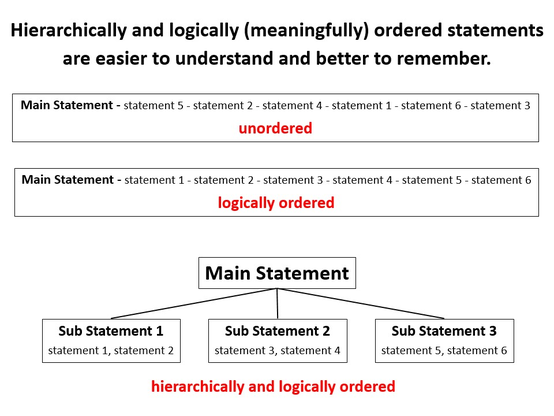
"Excellent memory performance is also the subject of the skilled memory theory of Chase and Ericson (1981). ... Chase and Ericson (1981) were able to demonstrate that the limits of working memory can be significantly overcome through meaningful structuring and the development of a hierarchical retrieval structure." (Hagemann, N., Tietjens, M., & Strauss, B. (Eds.). (2007). Psychologie der sportlichen Höchstleistung: Grundlagen und Anwendungen der Expertiseforschung im Sport. Hogrefe Verlag., p. 10)
If we want to build up our knowledge hierarchically, then we need analytical-creative thinking, because the existing knowledge is usually not complete. Sometimes the main statement is missing (e.g. in the interpretation of literature) or partial statements that are necessary to understand the main statement are missing. Even if all the statements are present, we still have to put them in the correct (= logical) order (see "How to write a text" on Learn-Study-Work). We also need analytical-creative thinking skills to form our own opinion (perhaps some statements are wrong or can be improved).
Does every subject have to be learned differently?
"Each discipline also has a different manner of posing questions and solving problems ... we note here that significant evidence demonstrates that effective teaching is content-specific, and not based on a toolbox of generic teaching techniques." (Darling-Hammond, L., Flook, L., Cook-Harvey, C., Barron, B., & Osher, D. (2020). Implications for educational practice of the science of learning and development. Applied developmental science, 24(2), p. 116)
Everyone has to decide for themselves how they learn or teach. Of course, every subject lesson is "content-specific", but if you can analyze the specialist knowledge well, learning is easy and fun. If you don't see much benefit in analyzing, you won't be able to remember the material for long. Conclusion: If you like analyzing, you learn better.
"People primarily perceive what they are interested in and what they already have prior knowledge about. This is the reason why everything that is related to their own preferences is learned so easily." (Rost, F. (2018) Lern- und Arbeitstechniken für das Studium. Springer VS, Wiesbaden, p. 43)
If you don't see much benefit in analyzing and drawing logical conclusions, you won't understand the learning material so well and won't be able to remember it for so long.
"A study published by the OECD in 2023 [next citation] shows ... performance measurement should focus on what matters. ... For the authors of the study, the ability to process information and solve problems plays a special, overarching role: in addition to sound specialist knowledge, this requires analytical, creative and critical thinking skills. They also cite social and emotional skills, tolerance and mutual respect ... as important complex skills." (www.telekom-stiftung.de/themen/kreativitaet-und-kritisches-denken-messen, 08/28/24)
"21st Century competencies refer to the capacity to perform real-life activities such as analysing information critically, creating innovative solutions to problems, working productively with others and communicating effectively to different audiences. These competencies allow individuals to adapt effectively to changes in the labour market and society, and perform tasks on the job or roles within their communities that computers cannot replace (Levy and Murnane, 2004[1])." (www.oecd.org/content/dam/oecd/en/publications/reports/2023/04/innovating-assessments-to-measure-and-support-complex-skills_b0255009/e5f3e341-en.pdf, 10/01/24, p. 46)
Read on Learn-Study-Work: "How to study", "What is Science", "What are scientific methods", "How to define words", "How to solve problems", "What is Respect", "How to respond to disrespect", "What is Health"
